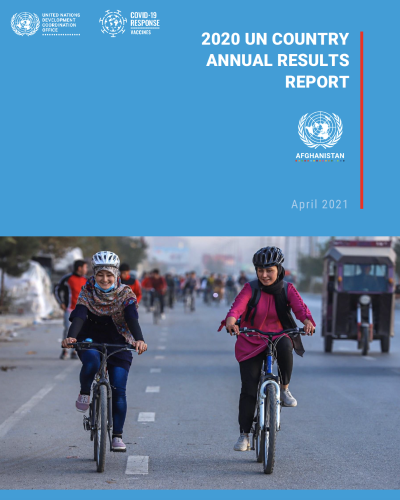2020 UN COUNTRY ANNUAL RESULTS REPORT

Foreword
The year 2020 was characterized by a number of key developments and historic milestones in Afghanistan. Despite the intense impact of the COVID-19 pandemic and continued violence, the peace process was launched, the Government convened the 2020 Afghanistan Conference with the United Nations (UN) and donor community in Geneva, and a new vision framework was endorsed. The Afghanistan National Peace and Development Framework II (ANPDF-II) was developed by the Government, with strong support from the UN in ensuring its alignment with the Sustainable Development Goals (SDGs) and the 2030 Agenda. A new accountability framework, the Afghanistan Partnership Framework, was also agreed on to ensure all stakeholders were working towards the same national priorities envisioned by the Government of State Building, Peace Building and Market Building.
The COVID-19 pandemic also provided the UN with the opportunity to demonstrate its ability to be agile and flexible by adjusting programming towards rapidly evolving needs. We were able to come out stronger, build better joint programming within the UN and with other partners to support the Government’s response planning. The regional impact of the pandemic resulted in record numbers of refugees returning from Pakistan and Iran, requiring swift mobilization of humanitarian entities. This increased the awareness that future programming would need to reflect more intentionally regional potentials and dynamics impacting recovery and sustainable development across boundaries.
Similarly, the gradual unfolding of the peace process highlighted the need for narratives and programming that would advocate for regional cooperation and coordination to rebuild trust and strengthen existing partnerships between Afghanistan and its neighbours. Leveraging peace dividends and focusing on economic development opportunities that would underpin gains became the focus of a regional outreach initiative jointly championed by the UN Assistance Mission in Afghanistan and the UN Country Team.
Finally, the implementation of important programmes continued unabated despite the fragile security situation in the subnational regions through the dedicated national and international civil society partners. This was critical to ensure that the people of Afghanistan have access to essential services, and that people-centred and inclusive programming can move forward while the political processes take place.
While 2021 remains full of unknowns, the UN remains steadfast in its commitment to the people of Afghanistan and the delivery of essential support to the Government.
Ramiz Alakbarov
Deputy Special Representative of the
Secretary-General and
UN Resident and Humanitarian Coordinator
in Afghanistan
(Find the full report in the attached PDF)




















